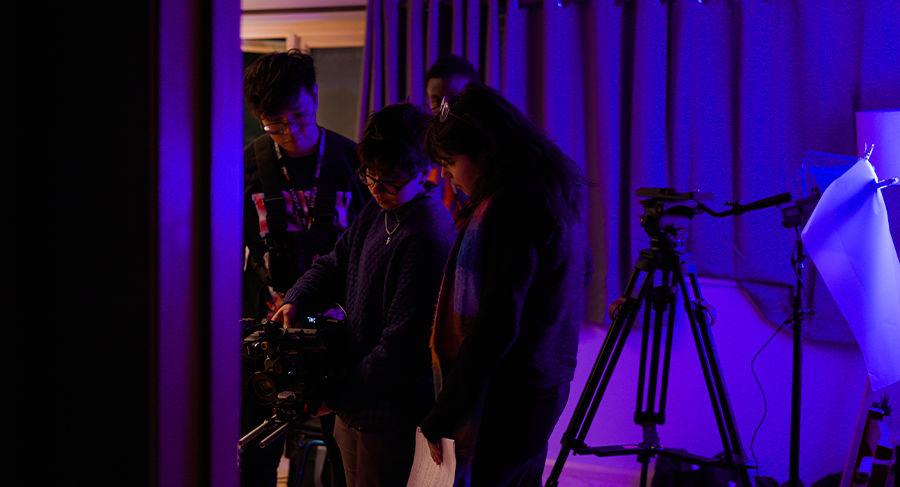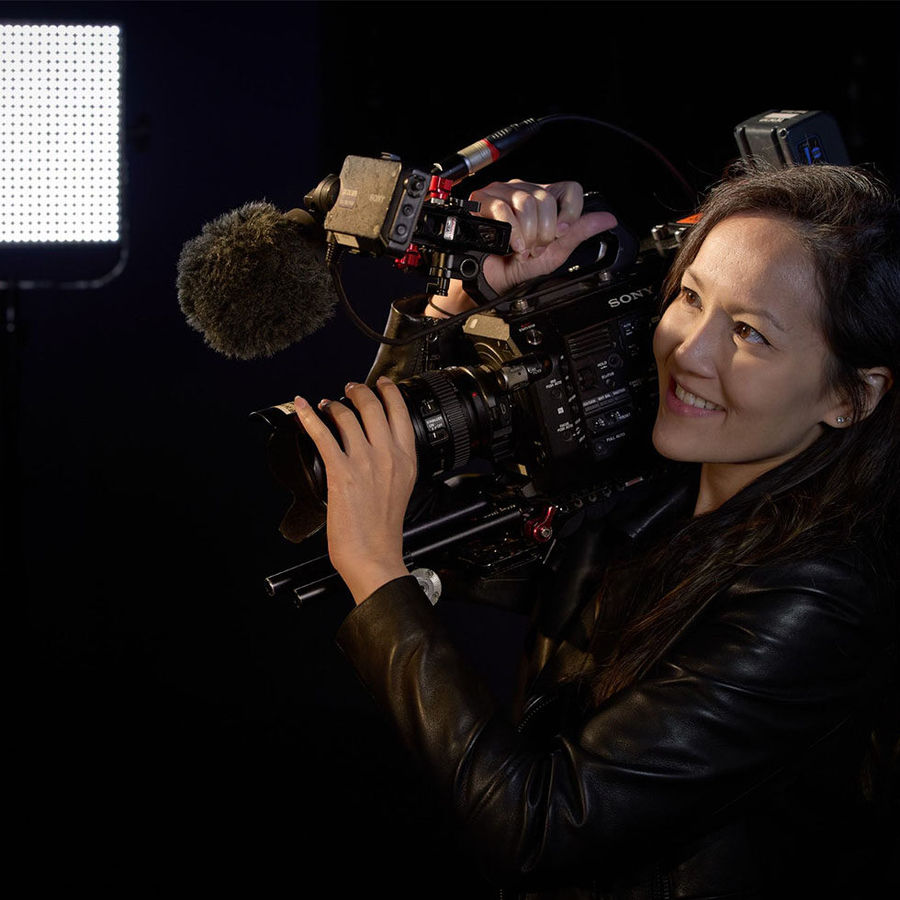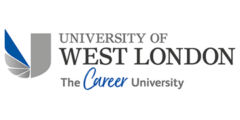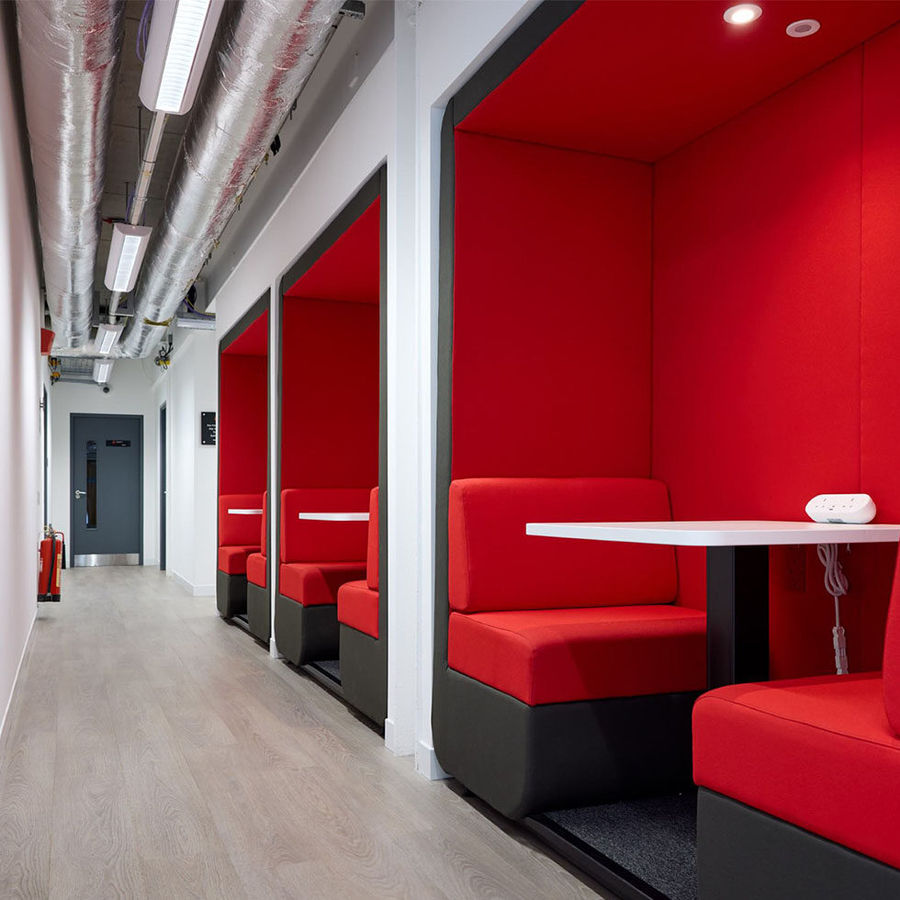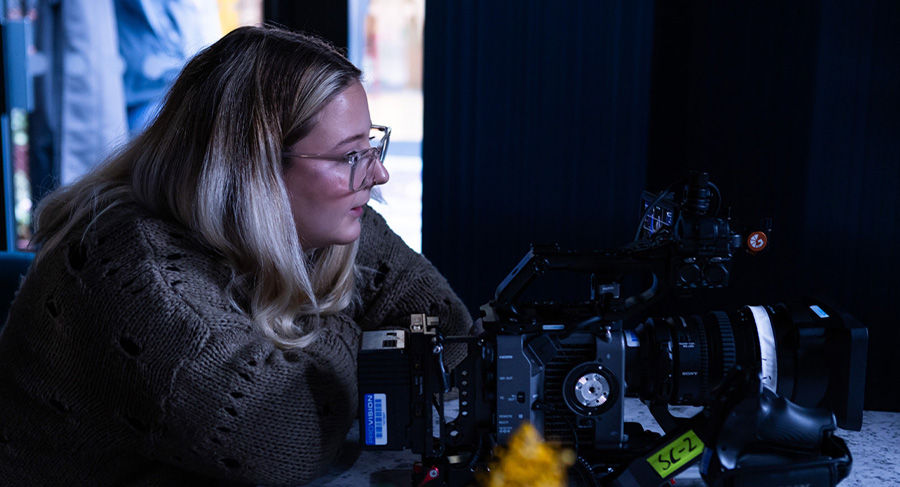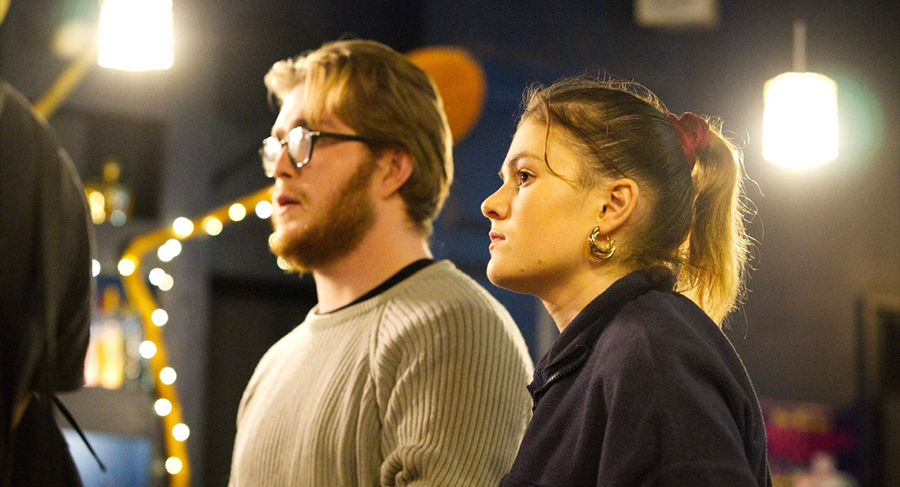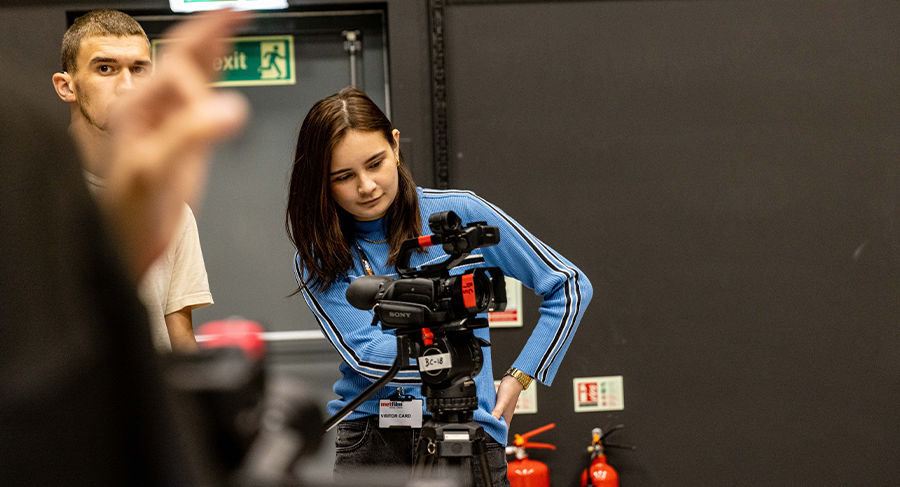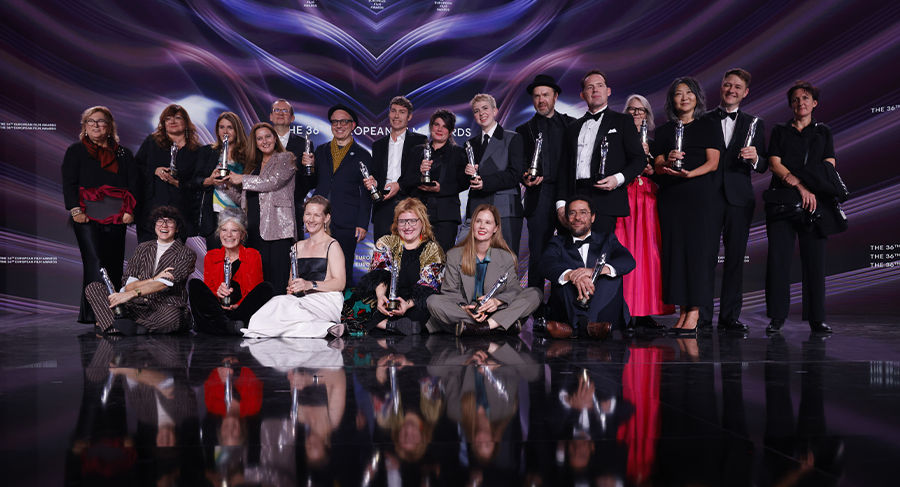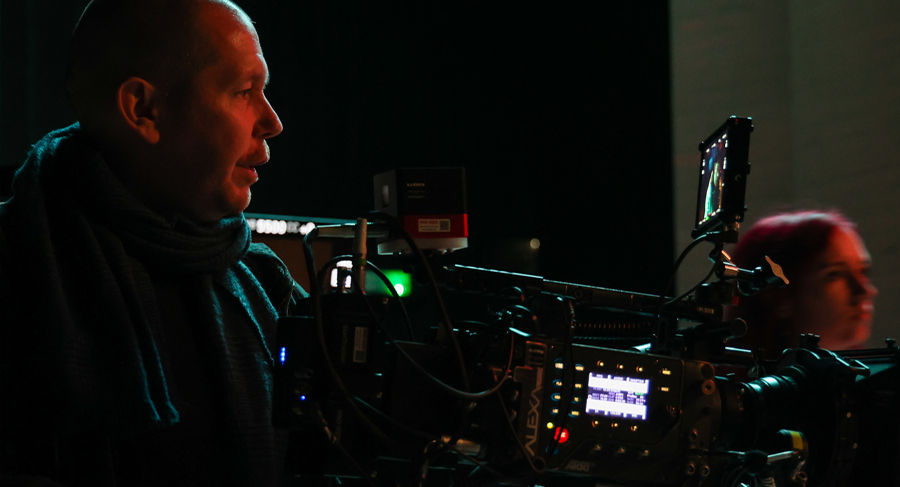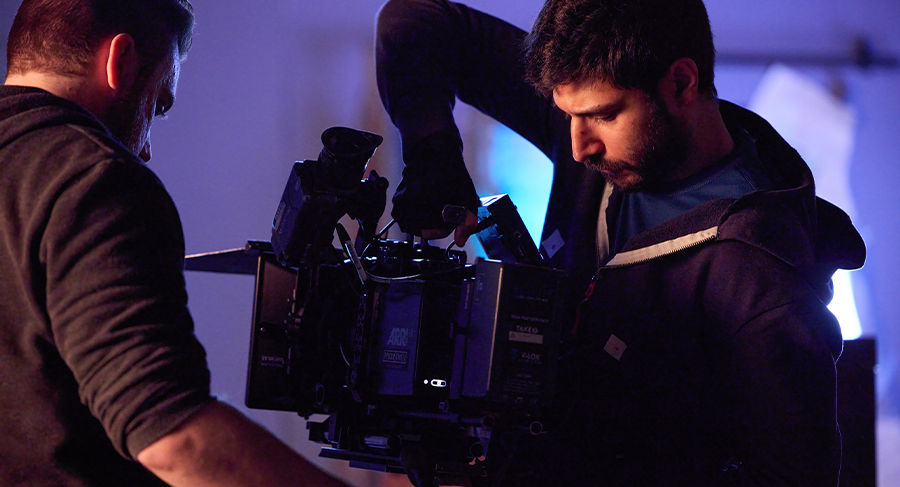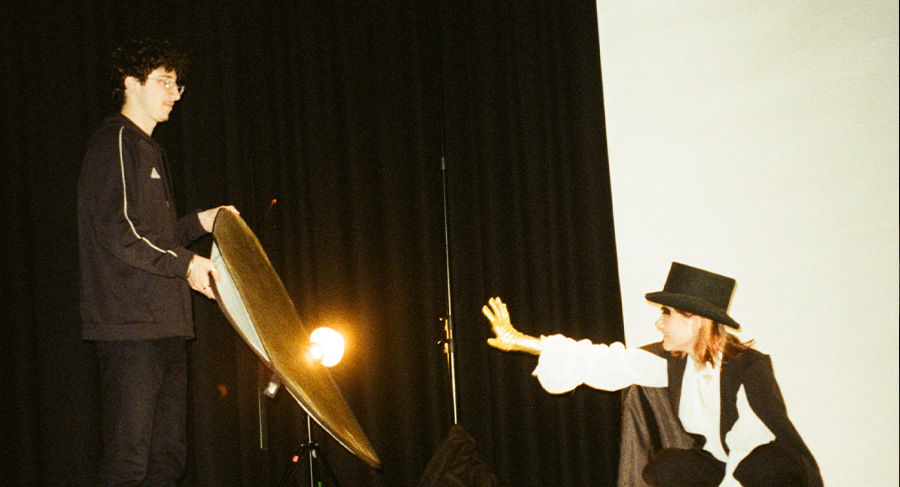The overview below is not a complete list of BA Practical Filmmaking (2 Year) modules, but rather the learning themes that this course will cover. For the complete list of modules, please download the full course specification below.
Story to Script: 20 Credits, Core
This module will introduce students to the fundamentals of developing a story or concept and adapting it into a screenplay. You will be guided in exploring the core principles of storytelling including plot, characters, conflict and resolution and how to develop these elements into a coherent three act structure. You will explore industry standard screenplay formatting and practice screenwriting techniques in dialogue, action and description by taking on the role of a script writer and practising screenwriting techniques.
Visual Approaches in Film: 20 Credits, Core
This module will introduce you to visual techniques created in the cinematography and post-production department. You will discover how mood and tone threads through into a story’s imagery. In the module, you will learn practical techniques in framing, composition and lighting that can identify meaning to a viewer. Alongside camera and lighting, you will explore editing techniques and styles that blend image and sound to create sequences that showcase time and space.
Fundamentals of Production Management: 20 Credits, Core
Managing and organising a film production is vital and addresses the logistical elements involved in producing a screen production. You will be introduced to management processes required to successfully produce a short film, especially during pre-production, including budgeting, scheduling, risk assessment and script breakdowns. The module will guide you to develop project management abilities and skills within a production office.
Short Film Production: 20 Credits, Core
Taking the skills and learnings from the previous modules so far, you will showcase your creative, technical and management skills in producing a short silent film in a collaborative setting. Taking on a head of department role, you will begin to develop transferrable skills during a production cycle and display storytelling through a variety of approaches. The module will guide you and your team to examine screen productions that remove language barriers and rely on emotions and visuals to convey a story to an audience. You will have an opportunity to collaborate across study disciplines with actors on the Screen Acting programme during this module.
World Cinema: 20 Credits, Core
This module explores films and filmmakers from around the world and their visual storytelling techniques that provide cultural context and ideologies to an audience. You will discover an array of films from different parts of the world and discuss the similarities and differences the productions adopt in creating national identity. Throughout the module, you will analyse how equality, diversity, and inclusivity can be represented through film, and how this has been achieved historically and in current approaches.
Director’s Lab: 20 Credits, Core
During this module, you will go on a journey to recognise the role and responsibilities of a director on a variety of digital platforms. You will explore how a screen director transforms the words from a screenplay or treatment into visual information including character development, setting, mood and tone. Working with actors is one of the key responsibilities of a director and the module will introduce you to working with actors and guide you to effectively communicate and ideate with them towards the holistic approach of creating characters. Alongside working with actors, you will practice casting techniques and explore best practices of holding a casting session.
Documentary Development and Production: 40 Credits, Core
This module examines factual storytelling and the importance of realism and facts that run through documentary productions. In this module you will develop and produce a short documentary film in a group setting while taking on a crew role. You will analyse and reflect on finding stories, working with contributors and/ or subjects and the narrative and treatment structures needed to present a visual concept. You will practice and apply visual techniques in camera, lights, sound and editing when reality is the main foundation of the story. Alongside developing your concept and technical growth, you will reflect on primary and secondary research methods and strategies to assist in the advancement of screen production and viewer engagement.
Film Theory and Language: 20 Credits, Core
Film history is vital in the growth of the current global film industry. You will study and research several movements, theories and filmmakers that have created a wave or trend within cinema. Through screenings, readings, guest lecturers and open discussions, you will develop your critical thinking on how certain film movements are considered evergreen and can be adapted into contemporary productions. The module will develop your understanding and knowledge in reading and analysing films as a form of text and the elements involved in creating a film language as a filmmaker.
Developing the Series: 20 Credits, Core
In this module you will examine several storytelling principles and professional attributes that can be applied to series productions. Through seminars, workshops and practical exercises, you will analyse how narrative and character arcs can stretch into long form episodic work. This module will bring you back into the key elements involved in story-telling techniques such as cultural foundations for a global reach. You will analyse OTT and online platforms and explore how platforms commission productions based on trends, algorithms and viewership.
Commercial Screen Production: 20 Credits, Core
Commercial productions act as one of the biggest marketing models with an international reach and provide screen practitioners with a platform to exercise their creative and technical abilities. This module will have you analysing client briefs and depicting brand guidelines in the creation of promotional productions. You will demonstrate research techniques to analyse national viewership, markets and platforms for the enhancement of commercials while producing work that is time sensitive and client driven.
Choice of specialism Cinema Elective (inc. Directing, Cinematography, Producing, Screenwriting, and Post Production): 20 Credits, Optional
This module gives you the opportunity to choose the discipline you would like to gain in-depth knowledge and experience in. You have the choice of an elective in directing, cinematography, producing, screenwriting or post-production. Based on the discipline you choose, you will examine, practice, test and develop technical, creative and or management skills within the chosen elective. During the module you will identify your strengths and areas of expertise within screen production and as an industry facing practitioner. The module will guide you to enhance your understanding of the roles and responsibilities of several key crew members and the relationships built between other heads of departments towards the successful creation of a screen productions.
Genre Production: 40 Credits, Core
This module examines several genres and sub-genres that follow a set of styles which are identifiable to a film practitioner and audience. You will employ research strategies to analyse how mise-en-scène elements are vital in a screen production, including set dressing, wardrobe styling and design, setting and background and sound design. In this module, you will take on a head of department role and work in a team to produce a 15-to-20-minute short film that reflects an advanced level of understanding in terms of narrative and technical skills and management workflows.
Graduation Project Development: 20 Credits, Core
This module is the first phase towards your final graduation project. You will develop and prepare your final graduation project. You will map the concept into a concrete plan and work on several pre-production elements to manage and finalise before entering the next phase of production and post-production or draft writing (depending on the project you decide to create). Based on the nature of your final graduation project, you will be assigned a mentor to guide and advise you on the logical, ethical and creative outcomes to professionally execute your project. At the end of the module, you will present your project and showcase a comprehensive level of work completed at the pre-production stage and provide evidence that the project is ready to progress into the production stage.
Creative Career Development: 20 Credits, Core
As the famous line in Casablanca (1942) goes, “Here’s looking at you kid”, this module revolves around you and exploring your identity as a film professional. The creative career development module gives you a platform to understand where you see yourself in the screen industry once you graduate and beyond. The module will analyse how you will create an efficient digital online presence that integrates your skills and experience to potential employers and/or agents. You will examine, test and create a digital portfolio that reflects your best work, describes your passion and provides you with your own voice, allowing you to reflect on the educational journey you have taken.
Graduation Project Delivery: 40 Credits, Core
The final module of your degree, this module is heavily based on self-directed learning and mentor support as you enter the production (or creation) and delivery stages of your graduation project. You will work on dividing your time to create a project, either in a team or individually while taking a key head of department role. You will work towards certain goals and objectives and deliver a final graduation project that will be showcased to an audience, including friends, family and industry professionals.
We include a diverse range of teaching methods which include:
- seminars in smaller groups;
- small group tutorials;
- practical group work;
- formative feedback through critiques/screening and reflective sessions;
- skills Labs – a reflection of ‘real world’ experiences; and
- enhancement activities.
We use a wide range of assessment which include portfolios, performances, research, presentations, and reflective work. Please download the Course Specification below for more information.
